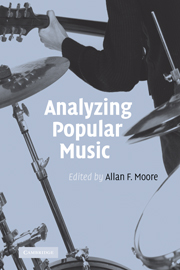Book contents
- Frontmatter
- Contents
- Acknowledgement
- Contributors
- 1 Introduction
- 2 Popular music analysis: ten apothegms and four instances
- 3 From lyric to anti-lyric: analyzing the words in pop song
- 4 The sound is ‘out there’: score, sound design and exoticism in The X-Files
- 5 Feel the beat come down: house music as rhetoric
- 6 The determining role of performance in the articulation of meaning: the case of ‘Try a Little Tenderness’
- 7 Marxist music analysis without Adorno: popular music and urban geography
- 8 Jethro Tull and the case for modernism in mass culture
- 9 Pangs of history in late 1970s new-wave rock
- 10 Is anybody listening?
- 11 Talk and text: popular music and ethnomusicology
- Bibliography
- Discography
- Film/Videography
- Index
11 - Talk and text: popular music and ethnomusicology
Published online by Cambridge University Press: 22 September 2009
- Frontmatter
- Contents
- Acknowledgement
- Contributors
- 1 Introduction
- 2 Popular music analysis: ten apothegms and four instances
- 3 From lyric to anti-lyric: analyzing the words in pop song
- 4 The sound is ‘out there’: score, sound design and exoticism in The X-Files
- 5 Feel the beat come down: house music as rhetoric
- 6 The determining role of performance in the articulation of meaning: the case of ‘Try a Little Tenderness’
- 7 Marxist music analysis without Adorno: popular music and urban geography
- 8 Jethro Tull and the case for modernism in mass culture
- 9 Pangs of history in late 1970s new-wave rock
- 10 Is anybody listening?
- 11 Talk and text: popular music and ethnomusicology
- Bibliography
- Discography
- Film/Videography
- Index
Summary
Introduction
The reflexive turn in recent years has dramatically repositioned the question of Theory. Despite the banality of the widespread recognition that ‘Theory’ is now a mass media performance art, and a global one at that, questions of what happens when garage bands read Hebdige, the Kaluli ponder Sound and Sentiment, and visual artists incorporate quotations from Foucault into their pictures and installations continue to press hard on issues of theoretical production. Who is ‘doing theory’ here? Can theory really do what it once claimed to be able to do, to explain and point the way forward? And is there any way of redrawing the line which once comfortably separated culture and theory? Clearly enough, Theory doesn't so much explain the world, but constitutes an important and inseparable part of what, itself, requires explanation and/or interpretation. Quite what it is that articulates that explanation, if no longer ‘Theory’, is far from clear and will no doubt remain so, to the consternation of many academic theorists. For others, both within and outside universities, the situation affords the hope that a more or less structured, more or less global, and more or less democratic conversation may emerge between those involved, and that the scope of this involvement is extended substantially beyond its current electronic horizons. In the process, clearly enough, the distinction between Theory as metadiscourse and the exclusive property of the privileged few, and Culture as a bounded field of largely implicit meaning shared by ‘the rest’, will disappear.
- Type
- Chapter
- Information
- Analyzing Popular Music , pp. 218 - 239Publisher: Cambridge University PressPrint publication year: 2003
- 5
- Cited by



